Des centaines de produits
Livraison rapide
Service supérieur
Une solution pour chaque culture afin de maximiser la lumière du soleil
Il est essentiel de disposer d'un climat adéquat dans votre serre. Certaines cultures ne supportent pas les températures élevées et la pleine lumière du soleil. En réfléchissant ou en diffusant la lumière du soleil, vous vous assurez que votre culture ne sera pas endommagée par une intensité lumineuse excessive. Il existe une grande variété d'agents d'ombrage et de couches réfléchissantes pour répondre à vos besoins.
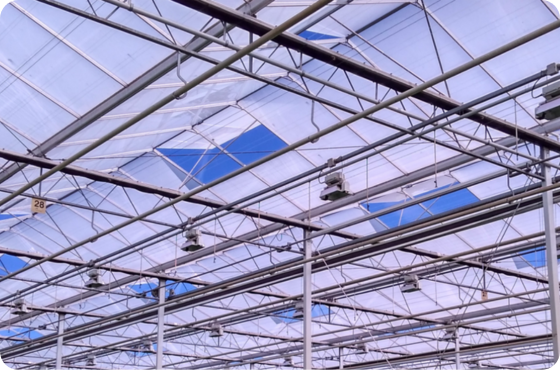
 Rendement plus élevé
Rendement plus élevé
 Facile à enlever
Facile à enlever
 Amélioration du climat de la serre
Amélioration du climat de la serre
Vous vous demandez comment les peintures d'ombrage et les enduits pour serres peuvent profiter à vos cultures?
 Élimine la formation de zones d'ombre
Élimine la formation de zones d'ombre
 Transmission et diffusion élevées de la lumière
Transmission et diffusion élevées de la lumière
 Augmentation du précieux rayonnement photosynthétiquement actif
Augmentation du précieux rayonnement photosynthétiquement actif
En tant que producteur agricole, vous souhaitez un climat stable dans votre serre afin de créer un environnement de croissance parfait pour la culture. Cela signifie que les pics de température doivent être réduits. La peinture pour le verre de serre contribue à créer un climat stable. Les agents d'ombrage réduisent la température de la serre en réfléchissant partiellement la lumière du soleil, ce qui protège vos cultures de la chaleur du soleil d'été.
Avec l'évolution des techniques de construction des serres et la sophistication des techniques de pulvérisation, la demande d'un système à la chaux plus perfectionné s'est également accrue. Ce système doit être plus facile, plus rapide, plus sûr et plus précis. Pour répondre à cette demande, deux types d'agents d'ombrage sont apparus : les agents d'ombrage liquides et les agents d'ombrage en poudre. Chacun d'entre eux présente des avantages uniques, en fonction de vos besoins. Les agents d'ombrage liquides Q3 White et Q4 White sont tous deux des agents crayeux à base de carbonate de calcium qui offrent une couche de protection différente. Quelle est la différence entre le Q3 et le Q4 White? Regardez la vidéo pour le savoir !
Q-Heat et D-Gree sont deux autres produits qui réduisent le stress des plantes. Q-Heat est un écran qui réfléchit le rayonnement thermique, ce qui permet d'obtenir un climat plus frais dans la serre. D-Gree est un enduit de diffusion qui assure une transmission maximale de la lumière diffuse et de la lumière de croissance (PAR). Il contient des pigments spécialement développés pour permettre une pénétration maximale de la lumière de croissance (PAR) tout en réfléchissant le rayonnement thermique.
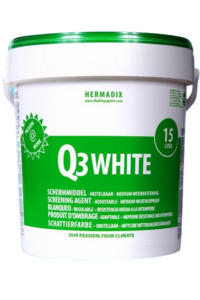
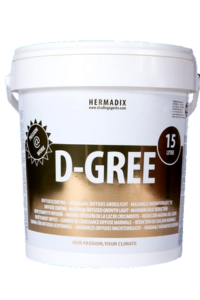
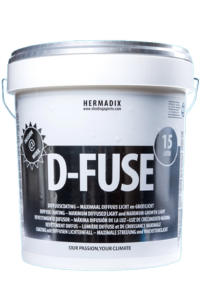
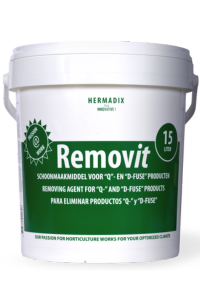
Contrairement aux agents d'ombrage, ils sont conçus pour laisser passer autant de lumière que possible. Au lieu de réfléchir les rayons, lesenduits de diffusion assurent leur transmission. Cela signifie une plus grande réception de la lumière dans la serre et une meilleure croissance des cultures. En floriculture, il a été prouvé que l'éclairage diffus permettait une meilleure croissance, et en culture maraîchère, il a été prouvé qu'il augmentait la production tout en améliorant la qualité des récoltes.
La lumière diffuse pénètre de manière plus homogène et plus profonde dans les cultures. Le verre diffuseur pour serres améliore l'efficacité de l'utilisation de la lumière par les cultures sous serre, ce qui augmente le rendement et offre des conditions idéales pour la culture. Si vous optez pour un enduit de diffusion, vous avez le choix entre plusieurs types. Celui que vous choisirez dépendra des besoins de votre culture.
La différence entre les différents produits réside dans la diffusion et la transmission de la lumière. Ces dernières années, le verre à diffusion est devenu de plus en plus populaire, en particulier dans la culture des légumes. L'effet du verre et de l'enduit de diffusion est le même : ils créent une lumière diffuse dans la serre, avec un degré de diffusion faible à élevé. Les différences entre le verre et un enduits de diffusion se situent au niveau du prix, de la flexibilité et de la durée de vie.
À la fin de l'été, lorsque la température baisse, il est important d'enlever la peinture d'ombrage du toit de la serre afin que la culture puisse bénéficier au maximum de la lumière naturelle. Removit est spécialement conçu pour enlever les produits d'ombrage Hermadix. Nos spécialistes peuvent vous conseiller sur la manière d'enlever la peinture d'ombrage de la serre.